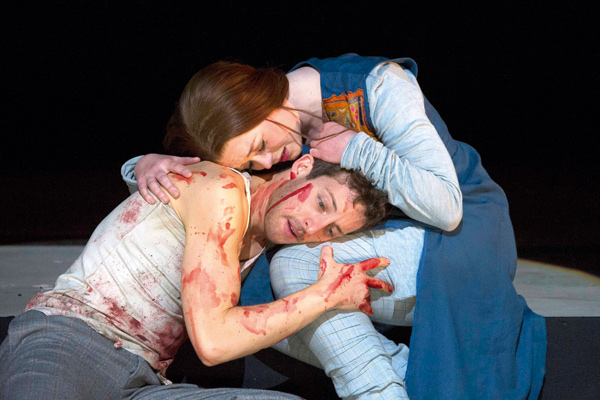Why stage a Handel oratorio, or anyone else’s for that matter? The recent urge to do it, with Bach’s Passions — even, I’m told, with Messiah — suggests a further incursion of TV into our lives, the inability to absorb anything that isn’t partly or primarily visual. At least Handel’s Joshua, which Charles Edwards directs and designs in a new Opera North production, is bellicose so there is a fair amount of action, though the most indelible parts of it are the choruses, some of them, strangely, sung with scores in hand, some not.
The setting is post-second world war, yet another production with an excuse for dressing the characters in dowdy clothes suggestive of a Ken Loach movie. There’s a conflict between what we see and the long and excellent programme note in which Ruth Smith argues that Handel’s contemporaries wouldn’t have given the Jews a second thought, but would have taken the whole story, including the Ark of the Covenant, to be symbolic of crises that Great Britain was passing through in the early 18th century. That would have made for a most interesting take on Joshua, but inevitably, I suppose, Edwards decided that the oratorio could be made into a contribution to the recent history of Israel.
It is an economy production, which is to be welcomed, so if you feel like going and just listening you won’t be missing a lot. The musical level is high, or on the first night became high after a shockingly ragged opening, in which the conductor and the chorus were in open conflict about the tempo. Once it settled down the chorus was, as always, superb. And so was most of the solo singing, especially from the performers of the two characters who constitute the love interest, Achsah, the leading Israelite Caleb’s daughter, and the young Othniel, who almost neglects his bloodthirsty duties to spend quality time with Achsah, stripping and sharing a spliff. Jake Arditti is Othniel, with a pleasant, penetrating countertenor voice, and other assets; Achsar is Fflur Wyn, a youthful veteran with a strong stage presence and the kind of lovely soprano that I’m happy to listen to as long as there isn’t too much for it to do. Stephen Layton conducts vigorously, and the slightly muted effect of the opening night may well disappear early in the run.
Verdi’s Don Carlo, in Nicholas Hytner’s 2008 production, has a super-starry revival at the Royal Opera, in Verdi’s five-act version, but without any of the noble and explanatory additions that Andrew Porter discovered in the early 1970s. A long evening should have been still longer. That is most evident at the opening, which in the version we heard seems to have lost its first few minutes, as indeed it has.
But it gives a chance to Jonas Kaufmann to sing his sole aria of the evening straight away, though it’s an odd piece: plangent, melancholy, but failing to establish a character. In fact the performer of the title role has to create a character at least as much of his own imagining as with the materials that Verdi gives him. Kaufmann, to my surprise, didn’t quite do that. A small element of narcissism has crept into his singing, so that one is more impressed by his astounding pianissimi than moved by the misery of the character. His alter ego, and the work’s true hero, the freedom fighter Rodrigo, is magnificently taken by Mariusz Kwiecien, whose death scene was the most poignant and searching part of the performance. Anja Harteros is a marvellous Elizabeth, though she held back for much of the time, but gave her all in her great Act V aria, and in the divine duet that follows. Ferruccio Furlanetto was on staggering form, singing Philip II with a firm, centred tone that hasn’t always been evident in recent years. Christine Rice being ill, Eboli is taken by Béatrice Uria-Monzon, fine to look at but with too small a voice to do justice to the determination of ‘O don fatale’.
With the odd reservation, it is a stunning cast. Yet the work didn’t move me as it usually has done, and as it always did in the great Visconti production from the first night in 1958 onwards. Why? The staging, though it avoids any breaks, does nothing to generate the required atmosphere of grandeur and claustrophobia. With fine period costumes, it is annoying to have sets mainly unimaginable before the late 20th century. And Antonio Pappano’s conducting left me, as so often, in two minds. Lots of fascinating detail, superb micromanagement, but failing to give this strangely constructed opera momentum. From the opening of Act IV onwards it is there anyway, but the disparate scenes that constitute the first three acts need to sound as if they are moving somewhere, and in this account, for all their beauties, they didn’t.
Many members of the audience, keen to treat this as a series of showpieces in fancy dress, made things worse by applauding for minutes on end after most of the celebrated set-pieces; they must have flown over from Italy. Perhaps it’s the First Night Syndrome, and later performances may realise the immense potential of these artists in this masterpiece.






Comments